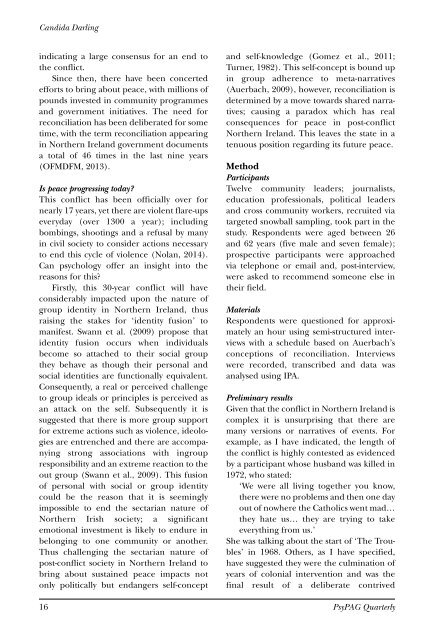Social Psychology Special Issue
PsyPAG-Quarterly-Issue-973
PsyPAG-Quarterly-Issue-973
You also want an ePaper? Increase the reach of your titles
YUMPU automatically turns print PDFs into web optimized ePapers that Google loves.
Candida Darling<br />
indicating a large consensus for an end to<br />
the conflict.<br />
Since then, there have been concerted<br />
efforts to bring about peace, with millions of<br />
pounds invested in community programmes<br />
and government initiatives. The need for<br />
reconciliation has been deliberated for some<br />
time, with the term reconciliation appearing<br />
in Northern Ireland government documents<br />
a total of 46 times in the last nine years<br />
(OFMDFM, 2013).<br />
Is peace progressing today?<br />
This conflict has been officially over for<br />
nearly 17 years, yet there are violent flare-ups<br />
everyday (over 1300 a year); including<br />
bombings, shootings and a refusal by many<br />
in civil society to consider actions necessary<br />
to end this cycle of violence (Nolan, 2014).<br />
Can psychology offer an insight into the<br />
reasons for this?<br />
Firstly, this 30-year conflict will have<br />
considerably impacted upon the nature of<br />
group identity in Northern Ireland, thus<br />
raising the stakes for ‘identity fusion’ to<br />
manifest. Swann et al. (2009) propose that<br />
identity fusion occurs when individuals<br />
become so attached to their social group<br />
they behave as though their personal and<br />
social identities are functionally equivalent.<br />
Consequently, a real or perceived challenge<br />
to group ideals or principles is perceived as<br />
an attack on the self. Subsequently it is<br />
suggested that there is more group support<br />
for extreme actions such as violence, ideologies<br />
are entrenched and there are accompanying<br />
strong associations with ingroup<br />
responsibility and an extreme reaction to the<br />
out group (Swann et al., 2009). This fusion<br />
of personal with social or group identity<br />
could be the reason that it is seemingly<br />
impossible to end the sectarian nature of<br />
Northern Irish society; a significant<br />
emotional investment is likely to endure in<br />
belonging to one community or another.<br />
Thus challenging the sectarian nature of<br />
post-conflict society in Northern Ireland to<br />
bring about sustained peace impacts not<br />
only politically but endangers self-concept<br />
and self-knowledge (Gomez et al., 2011;<br />
Turner, 1982). This self-concept is bound up<br />
in group adherence to meta-narratives<br />
(Auerbach, 2009), however, reconciliation is<br />
determined by a move towards shared narratives;<br />
causing a paradox which has real<br />
consequences for peace in post-conflict<br />
Northern Ireland. This leaves the state in a<br />
tenuous position regarding its future peace.<br />
Method<br />
Participants<br />
Twelve community leaders; journalists,<br />
education professionals, political leaders<br />
and cross community workers, recruited via<br />
targeted snowball sampling, took part in the<br />
study. Respondents were aged between 26<br />
and 62 years (five male and seven female);<br />
prospective participants were approached<br />
via telephone or email and, post-interview,<br />
were asked to recommend someone else in<br />
their field.<br />
Materials<br />
Respondents were questioned for approximately<br />
an hour using semi-structured interviews<br />
with a schedule based on Auerbach’s<br />
conceptions of reconciliation. Interviews<br />
were recorded, transcribed and data was<br />
analysed using IPA.<br />
Preliminary results<br />
Given that the conflict in Northern Ireland is<br />
complex it is unsurprising that there are<br />
many versions or narratives of events. For<br />
example, as I have indicated, the length of<br />
the conflict is highly contested as evidenced<br />
by a participant whose husband was killed in<br />
1972, who stated:<br />
‘We were all living together you know,<br />
there were no problems and then one day<br />
out of nowhere the Catholics went mad…<br />
they hate us… they are trying to take<br />
everything from us.’<br />
She was talking about the start of ‘The Troubles’<br />
in 1968. Others, as I have specified,<br />
have suggested they were the culmination of<br />
years of colonial intervention and was the<br />
final result of a deliberate contrived<br />
16 PsyPAG Quarterly


